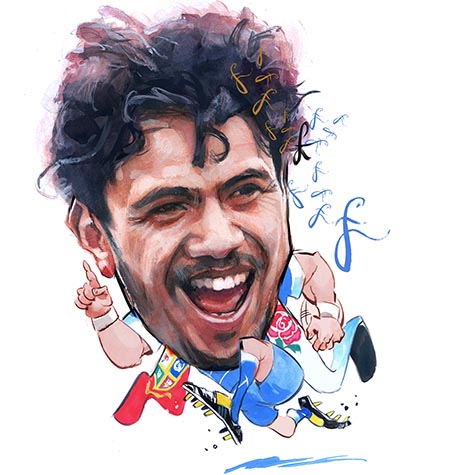 That Denny Solomona has had a phenomenal start to his Rugby Union career, with 11 tries in 11 matches for Sale Sharks, is not in doubt. There is also no arguing with the tremendous balance, athleticism, agility, and sheer try-scoring instinct that indicate that Solomona, 23, could be a Test calibre wing for England and even, as a very long shot, for the 2017 Lions.
That Denny Solomona has had a phenomenal start to his Rugby Union career, with 11 tries in 11 matches for Sale Sharks, is not in doubt. There is also no arguing with the tremendous balance, athleticism, agility, and sheer try-scoring instinct that indicate that Solomona, 23, could be a Test calibre wing for England and even, as a very long shot, for the 2017 Lions.
However, despite his obvious ability, neither England nor the Lions should touch Solomona with a barge pole. This has nothing to do with his qualities as a player, or as an individual. It is quite simply because he is a New Zealand-born Samoan who has already played one Test of international Rugby League for Samoa.
Six months ago when he was playing for Castleford Tigers before making a controversial cross-code transfer to Sale, he also declared that his heart was in playing for New Zealand or Samoa, and not England. This is understandable given that he was born and raised in Auckland by Samoan parents, before he moved at 17, with his family, to Australia to accept a pro Rugby League contract with Melbourne Storm.
This week we learned that Solomona has had a change of heart. Having served a three-year UK residency, and become engaged to marry an English girl, he has now decided he wants to put down roots in England.
To complicate matters there is also the lure of an England Rugby Union financial package which Solomona could not dream of matching if he stayed with his original allegiance to Samoa. England internationals currently enjoy a £30,000 per game match fee. This means that if Solomona was to play in the nine Tests on average per season he could earn up to £270,000 a year at international level.
That is on top of a club salary at Sale of about £250,000 a year, compared to a salary in the region of £50,000 at Castleford.
Let's make no mistake, the main driver behind Solomona's switch of allegiance to Rugby Union, and to England, is money – and no one should blame him for that. In a tough pro sport like rugby no one knows when serious injury will intervene to bring a career to a premature end, so wanting to maximise your earnings as a young player is a no-brainer.
The unfortunate reality is that RugbyUnion's best interests do not coincide with Solomona's most lucrative career path.
World Rugby's ludicrous three year residency rule is to blame for turning international rugby into a mercenary free-for-all with overseas players wrapping themselves in flags of convenience in return for greater financial security.
 The decision by Nathan Hughes to choose England over Fiji after he qualified on three year residency last summer was a case in point. I argued at the time in this column that the Wasps No.8 – who now has seven England caps – should not have had the option, because the residency ruling in international rugby ought to be at least seven years.
The decision by Nathan Hughes to choose England over Fiji after he qualified on three year residency last summer was a case in point. I argued at the time in this column that the Wasps No.8 – who now has seven England caps – should not have had the option, because the residency ruling in international rugby ought to be at least seven years.
I argued also that the best strategy World Rugby could introduce to encourage talented players like Solomona and Hughes from Tier 2 nations, like those in the South Pacific, to play for their home countries is to use their coffers to boost the match/squad fees available to them.
If it was £60,000 a season for overseas players returning to the Pacific Islands, rather than the current £60 a day, it might encourage more players from nations such as Samoa, Fiji and Tonga to play for the land of their birth, or parentage.
That is the boost the Tier 2 countries need so desperately to maintain their playing strength, and thereby stop international rugby's competitive base from shrinking. Combine that with the increase in fixtures between Tier 1 and Tier 2 nations, which World Rugby has scheduled, and you might have progress.
However, if all that happens is teams like New Zealand, England and Australia tour the Pacific Islands with players plundered from them – like Solomona and Hughes – and then beat them by a cricket score, World Rugby can expect the shrinkage to accelerate.
Instead of dithering, World Rugby should bring in their proposed increase to a five-year residency ruling immediately – and then seek to raise it to seven years as soon as possible. That would take the decision out of the hands of young players like Solomona, while at the same time providing them with greater financial incentives to play for the country which is truly closest to their heart.
As for the RFU, their ambivalence towards taking pre-emptive action to endorse the five-year residency ruling they support reeks of self-interest – and a willingness to be economical with their own ethics.
When questioned about the RFU's position on Solomona's eligibility, their chief executive, Ian Ritchie, argued that because the three-year ruling was still in place England were entitled to select him.
“Yes, we've been consistent in lobbying to change the rules (to five years), and once they are changed we will abide by the rules,” Ritchie said.
The bit that was left unsaid, but was implicit, was that until then England will fill their boots with overseas talent, rather than take a similar moral stance to French Federation boss Bernard Laporte, who has already applied the five-year rule.
The jarring inconsistency is that as England raid the South Pacific for players like Solomona, English-born stars such as Nick Abendanon, David Strettle and Steffon Armitage have been banned by the RFU from playing for their own country because they are resident in France.
When it comes to double standards in Rugby Union, sadly, this is ground-breaking stuff.


























